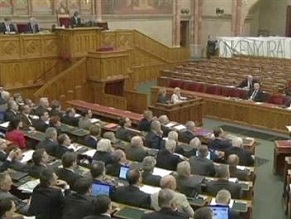|
World Jewish News

The Hungarian parliament voted Monday to limit the mandate of its constitutional court from overruling passed parliamentary laws dating from January 1, 2012, when the country’s new constitution came into force.
|
Europe weighs in to Hungarian constitutional amendments amid fears ‘it may weaken democratic standards’
13.03.2013, Jews and Society European Parliament President Martin Schulz expressed “regret” Monday after the Hungarian parliament moved to adopt controversial constitutional amendments, despite Europe’s fears of its “possible negative impact on the rule of law and respect for fundamental rights”.
The Hungarian parliament voted Monday to limit the mandate of its constitutional court from overruling passed parliamentary laws dating from January 1, 2012, when the country’s new constitution came into force.
The bill further devolves authority from centralised Budapest courts to regional authorities, as well as offering parliament the sole right to determine which religious authorities are determined ‘churches’ on a legal basis. This last clause is considered a direct response to a Constitutional Court ruling last month which deemed it unfair for parliament to legislate over whether a religious authority could maintain its legal status as a church, the implications of which could deny the authority access to state funding.
The clause also invokes recent controversy over last November’s calls from the extremer-right Jobbik party to create a register of Hungarian Jews in the interests of “national security”. Martin Gyongyosi of Jobbik was forced to apologise to his “Jewish compatriots”, after telling parliament that it was time “to assess...how many people of Jewish origin there are here, and especially in the Hungarian parliament and the Hungarian government, who represent a certain national security risk”.
The Hungarian government sought to distance itself from the controversial group’s stance, with a spokesman from its office insisting it “strictly rejects extremist, racist, anti-Semitic voices of any kind and does everything to suppress such voices”.
Jobbik, an extreme-right party with links to Iran currently holds 47 seats in the 386-seat Hungarian parliament. MP Gyongyosi, the party’s foreign affairs spokesman, came under fire last year for appearing to question the number of Hungarian Jews murdered and deported during the Holocaust, as he claimed it had become a political business to elevate the numbers. He said that Israel’s treatment of the Palestinians is a "Nazi system" and compared former Israeli Foreign Minister Avigdor Lieberman to Joseph Goebbels.
Slamming the passing of Monday’s bill, Human Rights Watch said the change in law left “no doubt about the Hungarian government’s contempt for the rule of law”, in a statement by its Eastern Europe and Balkans researcher Lydia Gall, as the group called on the EU to take concrete action, in addition to verbal condemnation from both Schulz and European Commission head Jose Manuel Barroso.
One such suggested action advocated by the group would be the EU implementing its fundamental right to suspend Hungary’s voting rights within the EU which it proposed, citing “the government’s blatant disregard for the rulings of the Constitutional Court (which) are at odds with the fundamental values of the EU”.
Schulz likewise called for an in-depth analysis of the implications of the ruling from the EU Commission, as he called for the Hungarian government to uphold its commitments to European laws and standards.
A joint statement by Barroso and the Secretary-General of the Council of Europe Thorbjorn Jagland Tuesday also noted “concerns over the ruling “with respect to the principle of the rule of law, EU law and Council of Europe standards”.
A full assessment will now be instigated,” they confirmed, as they reiterated calls to “the Hungarian authorities to engage in bilateral contacts with the European institutions in order to address any concerns”.
Meanwhile, Hungarian President Janos Adler travelled to Berlin Tuesday following the contentious vote in Budapest a day previously to meet with German Chancellor Angela Merkel and Foreign Minister Guido Westerwelle. A statement by Merkel’s office confirmed she “spoke critically of the recent decision by the Hungarian parliament to further amend the constitution”, as he called for the government to “responsibly use its two-thirds majority in parliament” to safeguard the country’s democratic legitimacy.
Additional comment from the federal foreign office confirmed the two politicians had conducted “an open and in part quite adversarial meeting” at which Westerwelle raised his own concerns.
by: Shari Ryness
EJP
|
|
